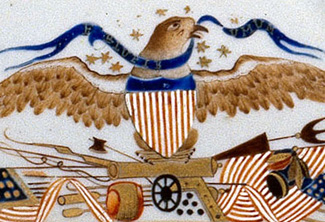Nathan Hale (1755-1776)

Connecticut's Nathan Hale is famous as the young spy who regretted that "I have but one life to lose for my country" when he was captured and executed by British troops in 1776.
Born in Coventry, Connecticut, on June 6, 1755, Hale graduated from Yale University in 1773 and was given a Master of Arts degree by the school three years later. He taught in Connecticut schools until 1775 when he exhorted his fellow New London citizens to support the American cause at a town meeting after receiving word of the battles of Lexington and Concord. Hale was commissioned a lieutenant in the Connecticut militia in July 1775 and then promoted to captain in the Continental Army in January 1776. In early May he led a daring raid on a British supply sloop, capturing it and earning the notice of his commanders. When George Washington was in desperate need of accurate information about the enemy's strength and disposition, he asked for volunteers for a spying mission behind British lines, and the 21-year-old Hale stepped forward.
Disguising himself as a loyalist schoolmaster, he went into British-held territory on Long Island on September 12. He likely gathered information about enemy positions and loyalist strength there before he was captured on the evening of September 21. In civilian clothes, carrying incriminating notes, and apparently admitting to his mission, Hale was judged a spy by British and loyalist officers. Moreover, his identity might have been revealed by a loyalist cousin, Samuel Hale. British Major General Sir William Howe ordered him to be hanged the next day. Howe's Orderly Book tersely recorded the event: "A spy for the Enemy (by his full confession) apprehended Last night, was this day Executed at 11 oClock in front of the Artillery Park." The casualty report for Hale's regiment merely lists that he was killed on September 22.
The exact circumstances of his mission, capture, final hours, and execution have been rich fodder for speculation ever since. There is little contemporary evidence for any of the events. The only record of anyone witnessing Hale's execution comes from a British officer, Frederick McKenzie, who wrote in his journal:
He behaved with great composure and resolution, saying he thought it the duty of every good officer, to obey any orders given him by his commander in chief; and desired the spectators to be at all times prepared to meet death in whatever shape it might appear.
Connecticut loyalist, Consider Tiffany, sheds a bit more light on Hale’s capture in a seemingly reliable manuscript history of the Revolution by describing how loyalist officer Robert Rogers, the famed commander of “Rogers’ Rangers,” coaxed Hale into confessing his clandestine mission.
It was not until the 19th century that historians attributed to Hale the final line "I only regret that I have but one life to lose for my country," which might be either a reference to a similar phrase from Joseph Addison's popular 18th-century play Cato ("What a pity is it / That we can die but once to save our country!") or taken from the writings of the 17th-century radical John Lilburne.
There are no portraits of Hale and the location of his remains are unknown. In 1846 the State of Connecticut and the Hale Monument Association erected a monument to his memory in the cemetery of his hometown.





